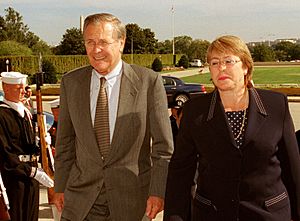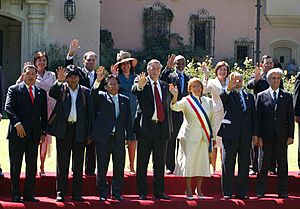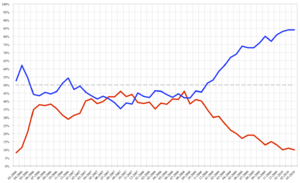Michelle Bachelet facts for kids
Quick facts for kids
Michelle Bachelet
|
|
|---|---|
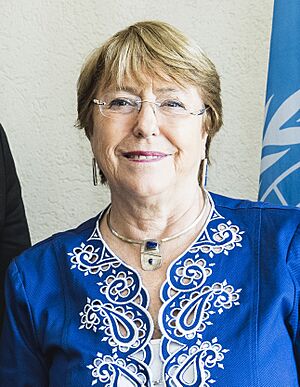
Bachelet in 2019
|
|
| 7th United Nations High Commissioner for Human Rights | |
| In office 1 September 2018 – 31 August 2022 |
|
| Deputy | Kate Gilmore |
| Secretary-General | António Guterres |
| Preceded by | Zeid Raad Al Hussein |
| Succeeded by | Volker Türk |
| 33rd & 35th President of Chile | |
| In office 11 March 2014 – 11 March 2018 |
|
| Preceded by | Sebastián Piñera |
| Succeeded by | Sebastián Piñera |
| In office 11 March 2006 – 11 March 2010 |
|
| Preceded by | Ricardo Lagos |
| Succeeded by | Sebastián Piñera |
| President pro tempore of the Pacific Alliance | |
| In office 1 July 2016 – 30 June 2017 |
|
| Preceded by | Ollanta Humala |
| Succeeded by | Juan Manuel Santos |
| Executive Director of UN Women | |
| In office 14 September 2010 – 15 March 2013 |
|
| Deputy | Lakshmi Puri |
| Secretary General | Ban Ki-moon |
| Preceded by | Position established |
| Succeeded by | Lakshmi Puri (acting) |
| President pro tempore of UNASUR | |
| In office 23 May 2008 – 10 August 2009 |
|
| Preceded by | Position established |
| Succeeded by | Rafael Correa |
| Minister for National Defense | |
| In office 7 January 2002 – 1 October 2004 |
|
| President | Ricardo Lagos |
| Preceded by | Mario Fernández Baeza |
| Succeeded by | Jaime Ravinet |
| Minister for Health | |
| In office 11 March 2000 – 7 January 2002 |
|
| President | Ricardo Lagos |
| Preceded by | Álex Figueroa |
| Succeeded by | Osvaldo Artaza |
| Personal details | |
| Born |
Verónica Michelle Bachelet Jeria
29 September 1951 Santiago, Chile |
| Political party | Socialist |
| Other political affiliations |
Concertación (1988–2013) Nueva Mayoría (2013–2018) |
| Spouse |
Jorge Dávalos Cartes
(m. 1978; separation 1984) |
| Children | 3 |
| Parents |
|
| Education | University of Chile (MD) |
| Profession | Paediatrician / Public Health Physician |
| Signature | |
Michelle Bachelet (born September 29, 1951) is a Chilean politician. She made history as the first woman to become President of Chile. She served two terms, from 2006 to 2010 and again from 2014 to 2018.
Before becoming president, Michelle Bachelet was a doctor who specialized in helping children. She also studied military strategy. She held important government jobs as the Minister of Health and the Minister of Defense. After her second term as president, she worked for the United Nations as the High Commissioner for Human Rights from 2018 to 2022. She is fluent in English and also knows German, French, and Portuguese.
Contents
Family Background and Early Life
Michelle Bachelet is the second child of Ángela Jeria Gómez, an archaeologist, and Alberto Bachelet Martínez, an Air Force General. Her family has roots in France, Switzerland, Spain, and Greece. Her great-great-grandfather, Louis-Joseph Bachelet Lapierre, came to Chile from France in 1860 as a wine expert. Her maternal great-grandfather, Máximo Jeria Chacón, was the first person in Chile to earn a degree in agricultural engineering.
Childhood Years and Education
Michelle Bachelet was born in Santiago, Chile. She spent her childhood moving around Chile with her family because of her father's military career. She lived in places like Quintero and Antofagasta. In 1962, her family moved to the United States for almost two years, where she learned to speak English very well.
She returned to Chile in 1964 and graduated from a top high school in 1969. In 1970, she started studying medicine at the University of Chile. She chose medicine because she wanted to help people and improve health in her country.
Difficult Times and Life Abroad
In 1973, there was a military coup in Chile, and General Augusto Pinochet took power. Michelle Bachelet's father, Alberto Bachelet, was detained and sadly passed away in 1974. In 1975, Michelle and her mother were also detained. They were held for a short time before they were able to leave Chile.
Michelle Bachelet went to Australia first, where her brother lived. Then, in May 1975, she moved to East Germany. There, she continued her medical studies. She married Jorge Leopoldo Dávalos Cartes, another Chilean exile, in 1977. Their first child, Jorge Alberto Sebastián, was born in 1978.
Returning to Chile and New Career Paths
In 1979, after four years, Michelle Bachelet returned to Chile. She had to restart her medical studies because her credits from East Germany were not recognized. She graduated as a doctor in 1983. She wanted to work in public health, but the government at the time did not allow it for political reasons.
However, she received a scholarship to specialize in pediatrics and public health. She also worked for an organization that helped children affected by the political situation. Later, she and her husband separated. She had two more children, Francisca Valentina and Sofía Catalina.
After Chile became a democracy again in 1990, Michelle Bachelet worked for the Ministry of Health. She became interested in how civilians and the military work together. In 1996, she began studying military strategy and even continued her studies in the United States. She earned a Master's degree in military science in Chile.
Early Political Career
Becoming Involved in Politics
Michelle Bachelet joined the Socialist Youth group in 1970, during her first year at university. After returning from exile, she became very active in politics in the late 1980s, working to bring democracy back to Chile. She became an important member of the Socialist Party.
In 1996, she ran for mayor of Las Condes, a part of Santiago, but did not win. She then worked to support Ricardo Lagos in his presidential campaign in 1999.
Minister of Health
On 11 March 2000, President Ricardo Lagos appointed Michelle Bachelet as the Minister of Health. At the time, she was not very well known. She worked to improve the public health system and reduce waiting lists in hospitals. She managed to reduce waiting lists by 90%.
Minister of National Defense
On 7 January 2002, she was appointed Minister of National Defense. This was a big step, as she was the first woman to hold this position in a Latin American country. As Defense Minister, she worked to improve relations between the military and those who suffered during the dictatorship. She also oversaw updates to the Chilean armed forces. A famous moment was when she led a rescue operation during a flood, riding on top of a military tank. This helped her become very popular.
2005–2006 Presidential Election
By late 2004, Michelle Bachelet was very popular in opinion polls. She was asked to run for president as the candidate for the Coalition of Parties for Democracy. She agreed, feeling she could not let her supporters down. On 1 October 2004, she left her government job to start her campaign.
In the December 2005 election, she won 46% of the vote, which was not enough to win outright. In the second round on 15 January 2006, she faced Sebastián Piñera and won with 53.5% of the vote. This made her Chile's first female elected president. She was also the first woman in Latin America to become president through a direct election without being the wife of a previous leader.
On 30 January 2006, after being declared president-elect, Bachelet announced her cabinet. For the first time, it had an equal number of men and women, as she had promised during her campaign.
First Presidency (2006–2010)
| The Bachelet Cabinet | |||
|---|---|---|---|
| Office | Name | Party | Term |
| President | Michelle Bachelet | PS | 11 March 2006–11 March 2010 |
| Interior | Andrés Zaldívar | DC | 11 March 2006–14 July 2006 |
| Belisario Velasco (resigned) | DC | 14 July 2006–4 January 2008 | |
| Edmundo Pérez Yoma | DC | 8 January 2008–11 March 2010 | |
| Foreign Affairs | Alejandro Foxley | DC | 11 March 2006–13 March 2009 |
| Mariano Fernández | DC | 13 March 2009–11 March 2010 | |
| Defense | Vivianne Blanlot | PPD | 11 March 2006–27 March 2007 |
| José Goñi | PPD | 27 March 2007–12 March 2009 | |
| Francisco Vidal | PPD | 12 March 2009–11 March 2010 | |
| Finance | Andrés Velasco | Ind. | 11 March 2006–11 March 2010 |
| Gen. Sec. of the Presidency |
Paulina Veloso | PS | 11 March 2006–27 March 2007 |
| José Antonio Viera-Gallo | PS | 27 March 2007–10 March 2010 | |
| Gen. Sec. of Government |
Ricardo Lagos Weber | PPD | 11 March 2006–6 December 2007 |
| Francisco Vidal | PPD | 6 December 2007–12 March 2009 | |
| Carolina Tohá (resigned) | PPD | 12 March 2009–14 December 2009 | |
| Pilar Armanet | PPD | 18 December 2009–11 March 2010 | |
| Economy | Ingrid Antonijevic | PPD | 11 March 2006–14 July 2006 |
| Alejandro Ferreiro Yazigi | DC | 14 July 2006–8 January 2008 | |
| Hugo Lavados | DC | 8 January 2008–11 March 2010 | |
| Social Development |
Clarisa Hardy | PS | 11 March 2006–8 January 2008 |
| Paula Quintana | PS | 8 January 2008–11 March 2010 | |
| Education | Martín Zilic | DC | 11 March 2006–14 July 2006 |
| Yasna Provoste (impeached) | DC | 14 July 2006–3 April 2008 | |
| René Cortázar (caretaker) | DC | 3 April 2008–18 April 2008 | |
| Mónica Jiménez | DC | 18 April 2008–11 March 2010 | |
| Justice | Isidro Solís | PRSD | 11 March 2006–27 March 2007 |
| Carlos Maldonado | PRSD | 27 March 2007–11 March 2010 | |
| Labor | Osvaldo Andrade (resigned) | PS | 11 March 2006–10 December 2008 |
| Claudia Serrano | PS | 15 December 2008–11 March 2010 | |
| Public Works | Eduardo Bitrán | PPD | 11 March 2006–11 January 2008 |
| Sergio Bitar | PPD | 11 January 2008–11 March 2010 | |
| Health | María Soledad Barría (resigned) | PS | 11 March 2006–28 October 2008 |
| Álvaro Erazo | PS | 6 November 2008–11 March 2010 | |
| Housing & Urbanism |
Patricia Poblete | DC | 11 March 2006–11 March 2010 |
| Agriculture | Álvaro Rojas | DC | 11 March 2006–8 January 2008 |
| Marigen Hornkohl | DC | 8 January 2008–11 March 2010 | |
| Mining | Karen Poniachik | Ind. | 11 March 2006–8 January 2008 |
| Santiago González Larraín | PRSD | 8 January 2008–11 March 2010 | |
| Transport & Telecom |
Sergio Espejo | DC | 11 March 2006–27 March 2007 |
| René Cortázar | DC | 27 March 2007–11 March 2010 | |
| National Assets | Romy Schmidt | PPD | 11 March 2006–6 January 2010 |
| Jacqueline Weinstein | PPD | 6 January 2010–11 March 2010 | |
| Energy | Karen Poniachik | Ind. | 11 March 2006–29 March 2007 |
| Marcelo Tokman | PPD | 29 March 2007–11 March 2010 | |
| Environment | Ana Lya Uriarte | PS | 27 March 2007–11 March 2010 |
| Women | Laura Albornoz | DC | 11 March 2006–20 October 2009 |
| Carmen Andrade | PS | 20 October 2009–11 March 2010 | |
| Culture & the Arts |
Paulina Urrutia | Ind. | 11 March 2006–11 March 2010 |
First Actions as President
Michelle Bachelet became President of Chile on 11 March 2006. She promised to implement 36 measures in her first 100 days. These included things like free healthcare for older patients and reforms to the social security system. Her first trip as president was to Argentina, where she signed agreements on energy and transportation.
Key Policies and Reforms
Social Programs
- Pension Reform: In 2008, Bachelet signed a law to reform the pension system. This law helped guarantee a minimum pension for the poorest 60% of the population.
- Worker Protection: In 2006, she passed a law to protect subcontracted employees, helping many workers. In 2009, she introduced a law to ensure equal pay for equal work, regardless of gender.
- Child and Family Support: The "Chile Grows with You" plan, signed in 2009, provided social services for young children. Her government also gave "literary briefcases" (boxes of books) to poor families with young children.
- Technology Access: The "I Choose my PC" program, launched in 2009, gave free computers to seventh-graders from low-income families who had good grades.
- Maternity Support: From 2009 to 2010, Bachelet's government provided maternity packages to all babies born in public hospitals.
Education and Transport
- Student Protests: In 2006, there were large high school student protests demanding better public education. Bachelet created a committee to propose changes to the education system. In 2009, she signed an education reform bill into law.
- Santiago Subway: During her presidency, 18 new subway stations opened in Santiago.
- Transantiago: A new public transport system called Transantiago was introduced in Santiago in 2007. It faced many problems and was very unpopular, which affected her approval ratings.
Response to the 2010 Earthquake
On 27 February 2010, near the end of her term, a powerful 8.8-magnitude earthquake hit Chile. It caused widespread damage and killed over 500 people. Bachelet declared a "state of catastrophe" and sent military troops to help. She was criticized for the slow initial response, but her government worked to manage the disaster.
Human Rights and Other Laws
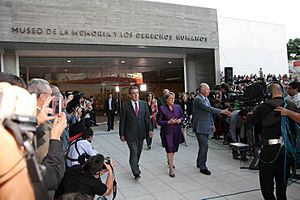
In 2009, Bachelet opened the Museum of Memory and Human Rights in Santiago. This museum tells the story of the human rights abuses during Pinochet's dictatorship. She also signed a law to create the National Institute for Human Rights.
Other important laws passed during her first term included a freedom of information bill in 2008 and a law creating the Ministry for the Environment in 2010.
Economy
Bachelet was praised for saving money from Chile's copper sales. In 2007, she created the Economic and Social Stabilization Fund. This fund helped her government pay for new social programs and economic support during the 2008 global financial crisis.
During her first term, Chile's economy grew steadily, and poverty decreased.
Political Challenges
Bachelet started her term with a majority in Congress, but she faced challenges from some lawmakers within her own coalition. When Augusto Pinochet died in December 2006, Bachelet decided not to give him a state funeral, but a military one. She did not attend the funeral herself.
Foreign Relations
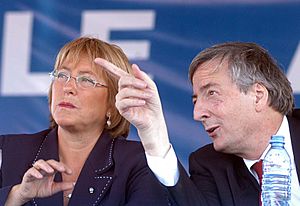
- Neighbors: Bachelet dealt with ongoing issues with Argentina and Peru. This included disagreements over natural gas exports and border definitions.
- United Nations: In 2006, Chile had to vote for a non-permanent seat on the United Nations Security Council. Bachelet decided that Chile would not vote for any candidate, due to disagreements within her government.
- South American Unity: In 2008, Bachelet became the first leader of the Union of South American Nations (Unasur). She called for a special meeting to help resolve a political crisis in Bolivia.
- Cuba Visit: In 2009, she visited Cuba and met with Fidel Castro, urging the United States to end its trade embargo against Cuba.
- International Trade: Her government continued to sign free trade agreements with countries like China, Japan, India, and Australia.
Popularity During First Term
Bachelet's popularity was high at the start of her term. However, it dropped significantly due to the student protests and the problems with the Transantiago transport system. By September 2007, her approval rating was 35%.
However, her popularity began to rise again during the global financial crisis in 2008. When she left office in March 2010, her approval rating was very high, at 84%.
Chile's Constitution does not allow a president to serve two terms in a row. So, Bachelet supported Eduardo Frei Ruiz-Tagle in the 2009 election.
Between Presidencies (2010–2014)
After her first presidency, Michelle Bachelet started her own research center called "Fundación Dialoga." She also became a member of the Club of Madrid, a group of former heads of state.
In September 2010, she was appointed head of the new United Nations body called UN Women, which focuses on gender equality and empowering women. She resigned from this role in March 2013 to prepare for her return to Chilean politics.
Presidential Election 2013
On March 27, 2013, Michelle Bachelet announced she would run for president again. Polls showed that many voters wanted her to be the next president. In June 2013, she won the primary election for the Nueva Mayoría coalition, becoming their official candidate.
In the November 2013 presidential election, she did not win an outright majority, so she went to a second round. On December 15, she won the runoff election with over 62% of the vote, defeating Evelyn Matthei.
Second Presidency (2014–2018)
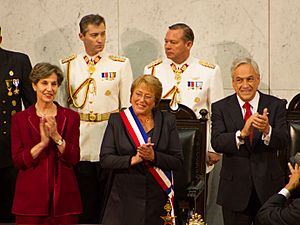
| The Bachelet Cabinet | |||
|---|---|---|---|
| Office | Name | Party | Term |
| President | Michelle Bachelet | PS | 11 March 2014–11 March 2018 |
| Interior | Rodrigo Peñailillo | PPD | 11 March 2014–11 May 2015 |
| Jorge Burgos | PDC | 11 May 2015–8 June 2016 | |
| Mario Fernández Baeza | PDC | 8 June 2016–11 March 2018 | |
| Foreign Affairs | Heraldo Muñoz | PPD | 11 March 2014–11 March 2018 |
| Defense | Jorge Burgos | PDC | 11 March 2014–11 May 2015 |
| José Antonio Gómez | PRSD | 11 May 2015–11 March 2018 | |
| Finance | Alberto Arenas | PS | 11 March 2014–11 May 2015 |
| Rodrigo Valdés | PPD | 11 May 2015–11 March 2018 | |
| Gen. Sec. of the Presidency |
Ximena Rincón | PDC | 11 March 2014–11 May 2015 |
| Jorge Insunza (resigned) | PPD | 11 May 2015–7 June 2015 | |
| Patricia Silva (caretaker) | PS | 7 June 2015–27 June 2015 | |
| Nicolás Eyzaguirre | PPD | 27 June 2015–31 August 2017 | |
| Gen. Sec. of Government |
Álvaro Elizalde | PS | 11 March 2014–11 May 2015 |
| Marcelo Díaz | PS | 11 May 2015–18 November 2016 | |
| Paula Narváez | PS | 18 November 2016–11 March 2018 | |
| Economy | Luis Felipe Céspedes | PDC | 11 March 2014–11 March 2018 |
| Social Development |
Fernanda Villegas | PS | 11 March 2014–11 May 2015 |
| Marcos Barraza | PC | 11 May 2015–11 March 2018 | |
| Education | Nicolás Eyzaguirre | PPD | 11 March 2014–27 June 2015 |
| Adriana Delpiano | PPD | 27 June 2015–11 March 2018 | |
| Justice | José Antonio Gómez | PRSD | 11 March 2014–11 May 2015 |
| Javiera Blanco | Ind. | 11 May 2015–19 October 2016 | |
| Jaime Campos | PRSD | 19 October 2016–11 March 2018 | |
| Labor | Javiera Blanco | Ind. | 11 March 2014–11 May 2015 |
| Ximena Rincón | PDC | 11 May 2015–18 November 2016 | |
| Alejandra Krauss | PDC | 18 November 2016–11 March 2018 | |
| Public Works | Alberto Undurraga | PDC | 11 March 2014–11 March 2018 |
| Health | Helia Molina (resigned) | PPD | 11 March 2014–30 December 2014 |
| Jaime Burrows (caretaker) | PDC | 30 December 2014–23 January 2015 | |
| Carmen Castillo | Ind. | 23 January 2015–11 March 2018 | |
| Housing & Urbanism |
Paulina Saball | PPD | 11 March 2014–11 March 2018 |
| Agriculture | Carlos Furche | PS | 11 March 2014–11 March 2018 |
| Mining | Aurora Williams | PRSD | 11 March 2014–11 March 2018 |
| Transport & Telecom |
Andrés Gómez-Lobo | PPD | 11 March 2014–14 March 2017 |
| Paola Tapia | PDC | 14 March 2017–11 March 2018 | |
| National Assets | Víctor Osorio Reyes | IC | 11 March 2014–19 October 2016 |
| Nivia Palma | IC | 19 October 2016–11 March 2018 | |
| Energy | Máximo Pacheco Matte | PS | 11 March 2014–19 October 2016 |
| Andrés Rebolledo | PS | 19 October 2016–11 March 2018 | |
| Environment | Pablo Badenier | PDC | 11 March 2014–20 March 2017 |
| Marcelo Mena | Ind. | 20 March 2017–11 March 2018 | |
| Women | Claudia Pascual | PC | 11 March 2014–11 March 2018 |
| Culture & the Arts |
Claudia Barattini | Ind. | 11 March 2014–11 May 2015 |
| Ernesto Ottone | Ind. | 11 May 2015–11 March 2018 | |
| Sports | Natalia Riffo | MAS | 11 March 2014–18 November 2016 |
| Pablo Squella | Ind. | 18 November 2016–11 March 2018 | |
Michelle Bachelet began her second term as President of Chile on 11 March 2014. It was a historic moment because both the President and the President of the Senate, Isabel Allende, were women.
Domestic Policies
Education Reform
One of Bachelet's main promises for her second term was to make university education free in Chile. She also wanted to stop educational institutions from making profits. This was a response to the 2011–13 Chilean student protests.
In 2015, a part of her plan was rejected by the Constitutional Court. However, the remaining part allowed 200,000 students from low-income families to attend college for free. In 2018, a law was passed that guaranteed free education for the poorest 60% of students.
Tax Reform
In 2014, Congress passed Bachelet's tax reform plan. This plan aimed to increase government income by raising taxes on companies and adding "green" taxes on things like carbon emissions.
Some critics said these tax changes slowed down Chile's economy. However, supporters argued that falling copper prices were more to blame.
Environmental Policy
Bachelet's government made significant efforts to protect the environment:
- In 2017, a large marine protected area was created around Easter Island, protecting many ocean species.
- In January 2018, five new national parks were created in the Patagonia region, covering millions of acres.
- In March 2018, just before she left office, Bachelet created nine new marine reserves. This greatly increased the protected ocean area around Chile.
Civil Unions
Bachelet made it a priority to pass a civil union bill. In January 2015, the bill was approved by both houses of Congress. It was signed into law in April 2015 and took effect in October 2015.
This law allows couples to have their unions legally recognized. It gives them rights similar to married couples, such as pension benefits and the ability to inherit property.
Political Reform
In 2015, the Chilean Congress changed the voting system. This new system made elections fairer and required that 40% of political candidates be women. This change took effect in the 2017 elections.
Following a scandal involving her son, Bachelet created a special council to fight corruption. This led to reforms that made politicians more accountable for their actions. In 2016, Chileans living outside the country were given the right to vote.
Foreign Policy
Trade Agreements
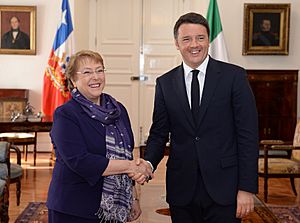
Just before she left office in March 2018, Chile signed the Comprehensive and Progressive Agreement for Trans-Pacific Partnership (CPTPP). This is a major trade agreement with 10 other countries in the Asia Pacific region.
Popularity During Second Term
Michelle Bachelet's approval ratings dropped significantly during her second term. In September 2015, her approval was 24%. This was mainly due to corruption scandals, including one involving her son and daughter-in-law.
By August 2016, her approval rating was at 15%, the lowest for any president since democracy returned in 1990. When she left office in March 2018, her approval rating was 39%, much lower than when she finished her first term.
UN High Commissioner for Human Rights (2018–2022)
On 10 September 2018, Michelle Bachelet became the United Nations High Commissioner for Human Rights. In this role, she spoke out about human rights issues around the world.
- China: She urged China to allow observers into Xinjiang due to concerns about the treatment of Uyghurs and other Muslims.
- Yemen: She criticized the conflict in Yemen and called for accountability for attacks on civilians.
- Hong Kong: She expressed concern about violence during the 2019–20 Hong Kong protests, emphasizing the importance of peaceful assembly.
- Iran: She was asked to investigate alleged human rights abuses during protests in Iran.
- Palestine and Israel: She issued reports on Israeli settlements in Palestinian territories, stating they are against international law. She also raised concerns about violence against Palestinians.
- COVID-19: During the pandemic, she asked the United States to ease sanctions on countries to help them deal with the virus.
- Nagorno-Karabakh: She expressed concern for civilians during the conflict between Armenia and Azerbaijan.
- Sri Lanka: She reported on Sri Lanka's failure to address human rights crimes from its civil war.
In May 2022, Bachelet visited Xinjiang, China. She praised China's efforts to reduce poverty and improve healthcare. She also raised concerns about human rights in Xinjiang and encouraged China to review its policies. Her visit received mixed reactions from human rights organizations.
On 13 June 2022, Bachelet announced she would not seek a second term as UN High Commissioner. She said she wanted to spend more time with her family. Her report on Xinjiang was published on her last day in the role.
Awards and Recognition
Michelle Bachelet has received many awards and honors throughout her career.
- She was ranked among the most powerful women in the world by Forbes magazine multiple times.
- Time magazine named her one of the world's most influential people in 2008.
- She received the Defense of Freedom and Democracy Award in 2007.
- In 2009, she was the first woman to receive the South American Football Honorary Order of Merit.
- She was recognized as one of the BBC's 100 women of 2017.
Honorary Degrees
She has received honorary degrees from many universities around the world, including:
- University of Brasília (2006)
- University of Essex (2008)
- Columbia University (2012)
- Katholieke Universiteit Leuven (2015)
Images for kids
-
Commemoration of Orlando Letelier, a former Chilean minister, who was assassinated in Washington, D.C., in 1976.
-
Bachelet with former Argentine president Néstor Kirchner.
See also
 In Spanish: Michelle Bachelet para niños
In Spanish: Michelle Bachelet para niños
 | Aurelia Browder |
 | Nannie Helen Burroughs |
 | Michelle Alexander |


